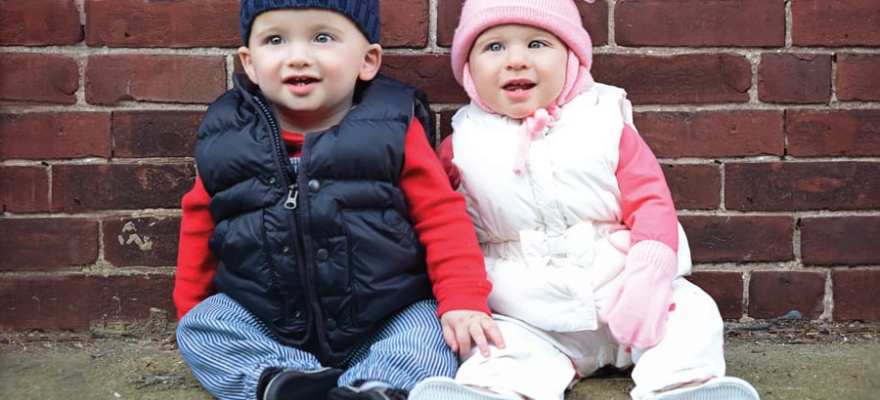
This past June, my husband and I learned that we would be expecting twins in the first weeks of 2015. As a mom of a 3-year-old singleton, the experience with my twin pregnancy has differed greatly from my earlier pregnancy with my son. A multiple pregnancy requires additional prenatal care, including more ultrasounds and other tests, due to the increased risk of complications and preterm birth.
After our shock was replaced with excitement, I began to wonder: How different would raising our twins be from raising our three-year-old son? Will it be double the trouble or double the fun?
Multiple births are on the rise in the United States, and many parents of twins will tell you it’s double the blessing. Of course, there is some extra work involved, with most parents learning how to navigate the day-to-day issues as they go. I was lucky to find three Staten Island moms willing to share their experiences and expertise. What I found out is, though they are the most common type of multiples, life with twins is anything but ordinary.
Do Twins Run In Your Family?
There are basically two types of twins: identical and fraternal. Identical twins occur when a single zygote splits into two embryos. Fraternal twins develop from two separate eggs fertilized by two different sperm. Fraternal twins are the only kind that can “run in the family,” because they can be due to a genetic component that causes hyperovulation, which is when the ovaries release more than one egg in a cycle. Hyperovulation can also occur due to fertility treatments or maternal age.
Moms of identical twins, like Carole Gervasi, Vice President of Marketing at CareerCo, are often shocked to learn they are expecting two babies. “We have no history of twins in the family,” she said, which is often the first thought when parents find out there are two!
Marissa M., local event planner and mother of boy/girl fraternal twins echoed that sentiment, “We have twins on three out of four sides of the family, so it shouldn’t have been a shock-yet we were!”
Read Next | This Is What Being Pregnant During Coronavirus Is Like
Are They Identical or Fraternal?
Complete strangers often ask parents of twins personal questions. The most common question is, “Are they identical?” The easiest way to tell is that identical twins are the same sex, because they split from one zygote and share the same DNA. Some babies, even boy/girl sets of twins, look a lot alike, but are not identical. In fact, fraternal twins share as much DNA as any other siblings – about 50%.
Marissa says, “Twins are a real crowd-pleaser,” and people are often amazed. Her family is frequently asked all types of questions, but even with one of each sex, she still gets asked if they’re identical. “They are a boy and a girl–so it’s impossible, but yet that’s the number one question!” Conversely, although Carole’s twins are obviously identical, she still gets asked, too.
Michelle, a designer and mom to 14 month-old boy/girl twins Mila and Massimo, agrees. “We get stares usually because most people are nervous to comment, but it’s kinda weird the way they just look at you, sort of acknowledging you have twins yet wanting to say something but just don’t.” And although her twins are also opposite sex, and cannot possibly be identical, she simply states, “Most people are not knowledgeable. I have to explain to them the difference. I’m a private person, so sometimes the attention gets to me. But some people genuinely think our family is adorable which makes me feel proud.”
Read Next | Is Having One Child Easier Than Having Two?
Are They Natural?
Another question moms and dads hear a lot is, “Are they natural?” The rise of twin births is attributed to increased use and availability of fertility treatments, including in-vitro fertilization (IVF). As more people turn to IVF and other fertility treatments, costs have declined. There are sixteen states that now require IVF be covered by health insurance policies. Another contributing factor is that women are having children later in life. Maternal age affects only fraternal twins, and doesn’t play a role in identical twins, because women are more likely to hyperovulate and conceive spontaneous twins at the age of 35 and above. According to the New York Times, “Two-thirds of the increase is probably explained by the growing use of fertility drugs and assisted reproductive technology. The remainder is mainly attributable to a rise in the average age at which women give birth.”
How Do You Tell Them Apart?
Another thing strangers (and moms expecting twins!) wonder is how parents tell their twins apart. My twins are fraternal, but are both girls. What if they look so alike that I mix them up?
Many moms have systems for their identical or same-sex twins, such as a bracelets or color-coding their clothing and other items. However, a lot of parents say they just get to know their faces and personalities. For Carole, her five-year-old girls have had about a one-pound weight difference since birth. It helped her tell who was who. Now, at five, they have distinguishing characteristics that make it easier for others. “Alyssa has a fuller face while Giulia has a more narrow face.” The girls also wear glasses in different colored frames.
Do You Have Other Children?
Expecting twins when you already have an older child opens up a whole array of questions and concerns. How do parents juggle it all? Parents do this everyday, right? There are many moms and dads out there who have experienced the joys of singletons AND multiples, and families learn to adapt to the needs of each child.
In addition to Alyssa and Giulia, Carole is also mom to 17-month-old Serena. Having tackled two at a time before having one has taught her how to manage her time, but also to change diapers with one hand! She says Serena “sort of just goes with the flow – she has to – but I think that’s a result of the fact that she is the third child, not necessarily a singleton.” She adds that having just one child to handle was so much easier that she was able to enjoy her infancy more.
Read Next | Wholly Unique, But Completely Twins
Does It Get Easier?
Like any other children, twins get easier as they get older. They start to develop their own interests and hobbies, and become more self-sufficient and independent. Some twins might be vastly different, while others have interests in the same topics and activities.
At 5, Carole’s daughters still share many of the same interests. She says, “My twins are extremely alike. They pretty much like the same things, though in different colors, whether its clothes or toys. They love dancing and singing, arts and crafts and watching silly movies.”
Things really started to change, she adds, when they started school. She considered splitting them up, wondering, “What if one twin is smarter in school?” and “What if they get teased in school?“
For Marissa and Michelle, not much has changed – yet. Marissa shares that Jake and Milana, at one, might still be too young to tell for sure, but that “their personalities are very different. They also look completely different, which still amazes me even after a year.”
For Michelle, her14 month-olds are also “still young, so they kinda are into the same thing, luckily.” She admits that she isn’t looking forward to the days when she has to organize drop-offs and pickups at completely different activities!
Support and Social Groups
Although there are significantly more twin births than there were as recently as the 1980s, multiples still attract much attention, as they account for only 3% of births in the US. People feel multiples are special – and they are right! There are many social and support groups, as well as festivals and conventions devoted to multiples.
Each year, the Twins Days Festival is held in none other than Twinsburg, OH (twinsdays.org). Twins, triplets, higher order multiples, and their families gather from all over the United States and all around the world.
Only another twin parent can truly understand both the challenges and joys that make parenting twins so different. For parents who prefer to stay local, there are many support and social groups. Carole Gervasi is the President of the Staten Island Mothers of Multiples Club. The club hosts special events, fundraisers, and meet-ups for local mothers of multiples.
How Do You Do It?
Many parents acknowledge that one child can be tough, especially newborns, and two must be doubly hard. Some of the most popular advice from twin parents is that you will need extra help, whether it is family and friends, a nanny, or a mother’s helper.
What works for one family may not work for another. Some families adhere to a schedule and some follow the babies’ lead. Carole and Michelle also agree that you, the parent, must follow your own instincts. Sometimes it’s okay to skip the housework in order to give your twins attention. While Marissa has a schedule and a system, she also doesn’t stress as much over keeping order. She keeps everything she needs for the twins handy. “It means more clutter but to save time it’s totally worth it.”
Read Next | How to Survive the Elementary School Years
Any Advice For New Parents of Twins?
Marissa says the best advice she received for her one-year-olds, Jake and Milana, was to keep them on the same schedule. She says, “If you feed, change, or bathe one-do the same for the other. If you are lucky enough to get one to nap, try and make sure the other baby is on that same nap routine. It’s efficient and will hopefully yield some untethered time. I also think that if you are truly determined and want it, nurse them. Twins are tough because they are generally born premature which means they have premature latching abilities and your milk supply is less than ideal.” Nursing twins is often extremely difficult but for Marissa, ultimately, it was “easier and just the most amazing bond one can imagine.”
Conversely, Carole advises, “Don’t be a stickler to get both to sleep at the same time. They are twins, not clones! While most twins will have very similar qualities, their personalities can be very different. Treat them like individuals.”
But don’t stress! Every family will figure out what works for them. As Michelle says, “The most important thing is to never second guess yourself. What you feel is right is usually right and what you feel is wrong is most likely wrong. So don’t drive yourself crazy. What the babies need is love. Don’t worry about the small stuff. Just like for any new parent, having a newborn is hard. You have to come up with your own system, not really go by what others do. Everyone’s personality, lifestyle, and family life is different so you can’t just follow someone else’s lead.”
By Jennifer Long, a Staten Island native, freelance writer, and mom to three. Although she’s busy being a mom to newborn twins, her other passions are her family, teaching, fitness, fashion, and the Oxford comma.

Read Next | This Is Everything You Need to Find an Amazing Summer Camp Program in Staten Island

